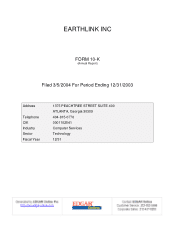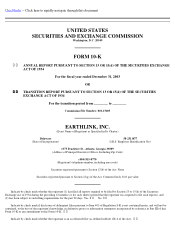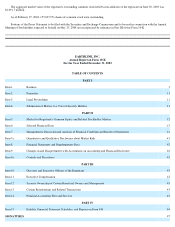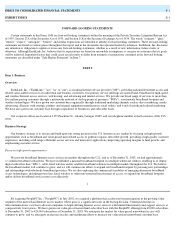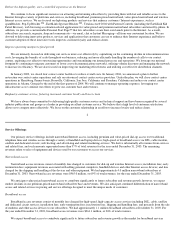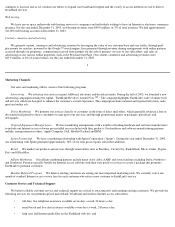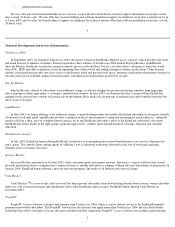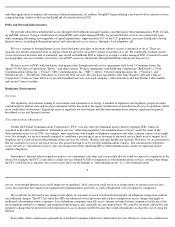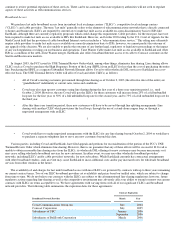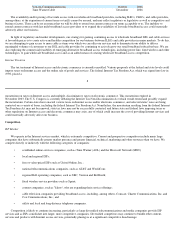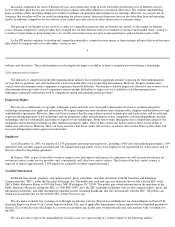Earthlink 2003 Annual Report Download - page 8
Download and view the complete annual report
Please find page 8 of the 2003 Earthlink annual report below. You can navigate through the pages in the report by either clicking on the pages listed below, or by using the keyword search tool below to find specific information within the annual report.
and other applications to enhance the customer's Internet experience. In addition, PeoplePC began offering a fee-based web accelerator service
using technology similar to that used in EarthLink Accelerator late in 2003.
POPs and Network Infrastructure
We provide subscribers with Internet access through both EarthLink managed facilities and third-party telecommunications POPs for dial-
up and DSL services. Using a combination of owned POPs and vendor-managed POPs, we provide Internet services on a nationwide basis,
while managing the timing and magnitude of capital expenditures. Approximately 92% of the U.S. population can access EarthLink's dial-up
Internet service, including both premium-priced and value-priced access services, through a local telephone call.
We use a strategy of buying Internet access from third-party providers in locations where it is more economical to do so. These are
typically less densely populated areas or regions where the provider can achieve greater economies of scale. We continually evaluate owned
versus outsourced decisions and, if warranted, may install an EarthLink POP to replace or overlap a vendor-managed POP. Customers located
in a geographic area not currently serviced by a local POP can access the Internet through EarthLink's dial-up toll free service.
We have access to POPs with third-party dial-up providers through network service agreements with Level 3 Communications, Inc.,
Sprint, UUNet, Qwest Corporation ("Qwest") and other carriers. We have agreements with BellSouth Corporation ("BellSouth"), Covad
Communications Group, Inc. ("Covad"), SBC Communications Inc. ("SBC"), Qwest, Verizon Communications Inc. ("Verizon"), and
WorldCom, Inc. ("WorldCom") that allow us to provide DSL services. We also have agreements with Time Warner Cable and Comcast
Corporation ("Comcast") that allow us to provide broadband services over each company's cable network in all Time Warner Cable markets
and certain Comcast markets.
Regulatory Environment
Overview
The regulatory environment relating to our business and operations is evolving. A number of legislative and regulatory proposals under
consideration by federal, state and local governmental entities may lead to the repeal, modification or introduction of laws or regulations which
do or could affect our business. Significant areas of regulation for our business include telecommunications industry regulation in general,
broadband access and Internet taxation.
Telecommunications Regulation
Neither the Federal Communications Commission ("FCC") nor any other governmental agency directly regulates ISPs, which are
classified as providers of unregulated "information services" rather than regulated "telecommunications services" under the terms of the
Telecommunications Act of 1996. Accordingly, most regulations which apply to telephone companies and other common carriers do not apply
to us. For example, we are not currently required to contribute a percentage of gross revenues to universal service funds used to support local
telephone service and advanced telecommunications services for schools, libraries and rural health care facilities. However, we are permitted to
bill our customers to recover universal service fees passed through to us by our telecommunications vendors. The classification of Internet
access services as "information services" may discourage states from regulating ISPs as telecommunications carriers or imposing similar
subsidy obligations.
Nevertheless, Internet-
related regulatory policies are continuing to develop, and it is possible that we could be exposed to regulation in the
future. For example, the FCC could subject certain services offered by ISPs to regulation as telecommunications services. Among other things,
the FCC could decide to regulate voice services provided over the Internet as "telecommunications" or a "telecommunications
6
service" even though Internet access itself might not be regulated. Such a decision could result in us being subject to universal service fees,
access fees and other fees imposed on regulated telecommunications providers as well as heightened costs of regulatory compliance.
We could also be affected by any change in the ability of customers to reach our network through dial-up telephone connections without
any additional charges. The FCC has ruled that ISPs are enhanced service providers and are thus exempt from access charges that apply to
traditional telecommunications companies. Local telephone companies typically assess charges on long-distance companies for the use of the
local telephone network to originate and terminate long-distance calls, generally on a per-minute basis. We could be adversely affected by any
regulatory change that would result in the imposition of access charges on ISPs because this would substantially increase the cost of using the
Internet.
State public utility commissions generally have declined to regulate enhanced or information services. However, some state commissions

